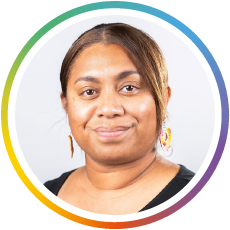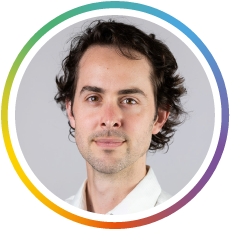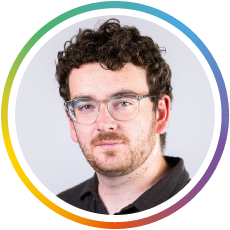
Members of Auckland’s Pasifika rainbow community report they feel shut out by their faith, their culture and their family. The discrimination they face isn't just based on ethnicity, but also on homophobia and transphobia – meaning they’re twice as likely to report symptoms of depression and to forgo healthcare than their non-rainbow peers.
But Pasifika rainbow experiences have never been properly studied, leading to gaps in support services. Now researchers are unpacking decades of data to paint a bigger picture. Torika Tokalau, Troels Sommerville, Sapeer Mayron and Ryan Anderson report.
In Auckland’s west, a 23-year-old Samoan struggles to find his place in the one community he’s always found solace.
On the North Shore, a 34-year-old Fijian tries to break free from the tormenting memories of beatings during his childhood that silenced his truth.
In south Auckland, two women grapple with how to describe themselves as Pasifika New Zealanders who don’t quite fit the mould.
These are just a handful of stories from the Pasifika queer community in Tāmaki Makaurau, who report they feel shut out by their faith, their culture, their family.
Their experiences have never been properly studied, and support services are patchy or non-existent, leading many to feel discriminated against, like they do not have a voice, like they are lost.


Transgender woman Robin Kapeteni experienced a lack of acceptance from some in her community.
Transgender woman Robin Kapeteni experienced a lack of acceptance from some in her community.


Seuta’afili Dr Patrick Thomsen is one of those trying to unpack decades of data about the wellbeing and healthcare system experience of the Pasifika rainbow community.
Thomsen, who leads the Manalagi Project, a three-year research project funded by the Health Research Council of New Zealand, is committed to painting the bigger picture.
“What we do know is that discrimination is an incredibly important factor that determines outcomes for Pacific and for rainbow [communities],” Thomsen says.
What we don’t know is what happens when those two [identities] come together.
Without detailed data, policy makers might keep ignoring people who have been routinely under-served in the health sector their entire lives, he says.
One of the things that make the experience of Pasifika rainbow people unique from the larger community is they often experience discrimination from multiple sides of society, including their family.
It’s not just based on ethnicity, it’s also based on homophobia and transphobia, he says, meaning wherever they go, they have to face that judgement.
Thomsen once met someone who was badgered so much while waiting for the bus to see their doctor they never made it to the clinic.
“Carloads of people driving past, beeping and screaming at them … it made them feel so minimised they decided to go home.
“It starts from when you just leave the front door for a lot of our communities.”

Seuta’afili Dr Patrick Thomsen is the leader of the Manalagi Project, a three-year research project on the Pasifika rainbow community.
Seuta’afili Dr Patrick Thomsen is the leader of the Manalagi Project, a three-year research project on the Pasifika rainbow community.
Research from 2019 found the health system is twice as likely to fail young people who identify as queer and Pasifika.
In the latest output of Youth2000 research, a long running survey by four New Zealand universities, Pasifika rainbow youth were more than twice as likely to report symptoms of depression and suicidal thoughts when compared to their Pacific non-rainbow peers or Pākehā non-rainbow peers.
For some, a disconnection from community touchstones, such as the church, pushes them to the edge. For 22-year-old transgender woman Robin Kapeteni, it was a lack of acceptance by some in her community.
“I kind of thought, if I’m like this, or if I'm the way that I am then why was I created in the first place? And so I thought the easiest option was just to erase myself from the world – from the equation,” Kapeteni says.
The erasure isn’t always as final, but still has far reaching consequences, as the research found Pasifika rainbow youth were twice as likely to report forgoing healthcare than Pākehā non-Rainbow youth. They were also five times more likely to report experiencing discrimination by a healthcare provider.
But the survey captured that data almost by accident – out of nearly 8000 teenage participants, just 103 were Pasifika and rainbow.
“That’s the biggest problem, we haven’t had enough of a direct focus. A lot of the stuff we’re getting is tangential, it’s still not fully explored,” Thomsen says.
One major step towards fixing this problem is including questions around gender and sexuality in the next national census – a move rainbow activists have been fighting for for years.

Robin Kapeteni considered taking her own life because of the way people treated her.
Robin Kapeteni considered taking her own life because of the way people treated her.


Fijian man Manasa Cua uses dance to express himself after years of hiding who he is.
Fijian man Manasa Cua uses dance to express himself after years of hiding who he is.



Trans rights advocate Phylesha Brown-Acton says poor data collection has failed Pasifika queer communities.
Trans rights advocate Phylesha Brown-Acton says poor data collection has failed Pasifika queer communities.
Phylesha Brown-Acton, a long-standing trans rights advocate and co-founder of the only Whanau Ora-funded Pasifika rainbow-focused health service F’INE Pasifika, says poor data collection has failed Pasifika rainbow communities over and over again.
For example, in a study on HIV/Aids, trans women’s experiences were recorded as “men who have sex with men”, which is inaccurate, she says.
The Manalagi Project hopes to survey between 500 and 1000 respondents on their experiences of wellbeing in all forms.
Global studies suggest some 5 to 7 per cent of any given population will be queer, and Manalagi researchers say even that might not be reliable, as rainbow Pasifika struggle with the traditional categories in research.
Brown-Acton, who is also an investigator on the Manalagi Project, says home comes well before sexuality or gender identifiers.

Phylesha Brown-Acton wants more people to use the Pacific names for people with a third gender.
Phylesha Brown-Acton wants more people to use the Pacific names for people with a third gender.
“I am tagata Niue first, before I am anything else,” she says.
“The Western approach is ‘I am a lesbian, I am gay’. For us, that’s not how we present ourselves if we were to walk into a room of people who didn’t know us.
“It’s just like how Māori do a pepeha, it’s important to do that. It’s the acknowledgement of where you extend from, that’s your genealogy, those are the connection points to your environment.”
Before the arrival of colonialism and Christianity in the Pacific, people with a third gender were respected and valued in their communities in ways modern trans people are not.
The Pacific names used to describe them are summarised today in a contemporary acronym: MVPFAFF+, coined in part by Brown-Acton, who wants wider society to use and hear the indigenous terms more, and to be inspired to learn more about them. They are:
- Mahu (Hawai’i and Tahiti)
- Vaka sa lewa lewa (Fiji)
- Palopa (Papua New Guinea)
- Fa’afafine (Samoa)
- Akava’ine (Rarotonga)
- Fakaleiti (Tonga)
- Fakafifine (Niue)
“They are familiar terms to many of our people so they’re not responded to in the same, negative way. They exist within the language and the context,” Brown-Acton says.
“I use [the term] trans woman because that connects me to my political activism but also to my journey of transition and trans medicine.
Fakafifine grounds me in my cultural foundations. It’s my mother tongue, and connects me to my land of Niue, and it describes me in a more expansive and a more encompassing way.

Amanaki Prescott-Faletau describes herself as fakaleitī, a Tongan word that suits her better than ‘trans’.
Amanaki Prescott-Faletau describes herself as fakaleitī, a Tongan word that suits her better than ‘trans’.
Amanaki Prescott-Faletau, F’INE navigator and creative, uses trans where it would be more commonly understood but prefers to use fakaleitī – the Tongan word for ‘in the manner of a woman’.
“I am trying to proclaim it as a term used for power. Fakaleitī is something from my own home, it reminds me of my role in the house.
“We’re the babysitters, we’re the caretakers, we mow the lawns, we cook the food, we build the church with a baby on our hip.”
Prescott-Faletau says one way MVPFAFF+ people express themselves all over the Pacific is through the arts, dance and drama arena.
Maybe there is this yearning of wanting to be heard, or wanting to be seen, she suggests.
“They want to do something so natural to them, which is dancing, cause it’s a no brainer. You don’t need to think about it. Play some music and we naturally let our bodies cater to the music.”
Her own dance troupe, Fine Fatale, is the only dance group made up entirely of MVPFAFF+ people. By day, they are dentists, volleyball players, med students and more.

Amanaki Prescott-Faletau says it’s natural for Pasifika queer people to express themselves through dance, arts and drama.
Amanaki Prescott-Faletau says it’s natural for Pasifika queer people to express themselves through dance, arts and drama.
If dance hadn’t found its way into her own life, Prescott-Faletau’s first career plan was to become a police officer. She even tried to start a course in preparation last February, but was invited to produce the first ever Pasifika Pride festival, called F.I.N.E. Festival.
“I remember my dad telling me that God gives us a purpose not for ourselves but a purpose to serve others.
“Every year that goes by I get bigger opportunities in the arts that I never have gotten before, so I hate to admit it, but yeah I should be in this space, because these opportunities aren’t coming for nothing.”
But not everyone in the community is comfortable with their identity, and that is partly down to the fact many do not feel represented.
The first ever national survey of trans and non-binary people in New Zealand on their health and wellbeing, Counting Ourselves, didn’t come until 2018.
It found “the stark contrast and health inequities” between trans and non-binary people and the general population when it comes to mental health, wellbeing and the risk of suicide attempts.
“Counting Ourselves participants reported widespread discrimination, especially in public places, trying to find a job or housing and at work,” the report says.
“Most did not have the correct gender marker on their identity documents, and many of these participants reported that this resulted in harassment and other negative and stressful experiences in many areas of their lives.”


Getting her nails done with her cousin was a gender-affirming experience for Missy Prescott.
Getting her nails done with her cousin was a gender-affirming experience for Missy Prescott.


Brown-Acton says helping people correct their gender marker and their names on official documents is one of the most meaningful things F’INE Pasifika does.
There are so many ways someone’s deadname - their given name at birth – or incorrect gender can creep up on someone, she says.
Every kind of document needs to be updated when someone transitions, and it can be easy to miss some.
A person might successfully change their name in government records but forget to change it at their bank. When they share their banking details with an employer, they have to explain whose bank account it really is.
Or they may have missed updating their doctor’s records. So if they have called in sick and require a medical certificate, their clinic might use their deadname on that document, Brown-Acton says.
Inland Revenue, Kiwisaver, passport copies for human resources can all be tripwires between a trans person and their dream job.
These are just some of the stories Pasifika trans women have told the F’INE team when they come looking for help.
The confidence boost and validation they experience when it is all sorted is priceless.
“It’s a more positive and affirming reality for them,” Brown-Acton says.
The report says improving access to gender-affirming healthcare in the public healthcare system would go a long way for trans people, from hormone treatment to hair removal.
“People say that’s cosmetic. That’s not cosmetic, it is life saving,” Brown-Acton says.

Missy Prescott realised she was different when she was in year nine at high school.
Missy Prescott realised she was different when she was in year nine at high school.
For Missy Prescott, getting her nails done professionally was an important step towards deciding to medically transition.
It wasn’t until year nine at Kelston Boys’ High School that Prescott realised she was different to the other students – softer, more feminine. Those who were more like her called themselves fakaleitī, faafafine, or trans, words she had never heard before.
They helped her learn the vocab that came with their identities, and it was her cousin, Faletau Prescott, who invited her to get a manicure and took her along the path to affirming her gender physically, to match how she already felt.
“We did our nails together, and after that, I knew I was a woman. She introduced me to the pill, and gave me the down low of [being] a trans woman.
“Back at high school, I was [accepted as] a woman, I didn’t need to tell you otherwise.”
Lots of parents and elders say they want to know how to better support rainbow members of their family and in their community, Thomsen says. Community talks have been the perfect ground to tackle hard conversations.
“Because the approach has been so grounded in community and grassroots, what we have been able to do is take the kaupapa and its essence to community members.
“Even those who are conservative, we’ve been able to take them on the journey with us around the thinking.
“Pacific communities will always want to help if they believe the kaupapa is right.”


Like many in the Pasifika rainbow community, Iatua Taito expresses himself through dance.
Like many in the Pasifika rainbow community, Iatua Taito expresses himself through dance.



Iatua Taito is hopeful a more open discussion can help bring about a more inclusive view of the rainbow community, especially in the church.
Iatua Taito is hopeful a more open discussion can help bring about a more inclusive view of the rainbow community, especially in the church.
Brown-Acton says there may be issues within some families, but more and more she sees people staying in relationships, being treated with dignity and respect.
This might rest on their family’s faith and relationships with their churches.
For many Pasifika, church and faith are as integral to their culture as more ancient customs, with many still trying to find a balance between the two.
Thomsen explains how gender binary was imposed on the Pacific Islands by missionaries and colonial powers, and the impact of the church and western culture on the third genders of the Pacific was huge.
For Iatua Taito, it has meant compartmentalising part of who he is in order to practise his faith among the church community.
You do feel included, but not fully included.
“Because there’s always that theology that is still really going to bite into you,” he says.
As a New Zealand-born Samoan, he found a connection to his culture through his church, but also understood the more overtly queer parts of his personality were best kept hidden away to avoid antagonising others’ sensibilities.
Yet he is hopeful a more open discussion can help bring about a more inclusive view of the rainbow community.
“That’s where you bring your language and your histories, you learn your love for your genealogies through the church,” he says.
“And so it’s important to talk about the church in a healthy way because a lot of that's where we get our sense of community from.”
It’s because of situations like this that Thomsen and his researchers will also look at how the Pasifika Rainbow communities relate to religion and the church.
It’s because of situations like this that Thomsen and his researchers will also look at how the Pasifika Rainbow communities relate to religion and the church.
“We are not assuming that the role has to be antagonistic. There is no assumption that the church and being queer cannot go together,” he says.
“Most people I know haven’t been kicked out by their families but there are others who were forced out on the streets because of their family’s church conservatism.”



Getting to the truth takes patience and perseverance. Our reporters will spend days combing through documents, weeks cultivating delicate sources, and months – if not years – fighting through the Official Information Act, courts and red tape to deliver their stories.
By supporting Stuff you’ll help our journalists keep the pressure on. Make a contribution from as little as $1 today.




